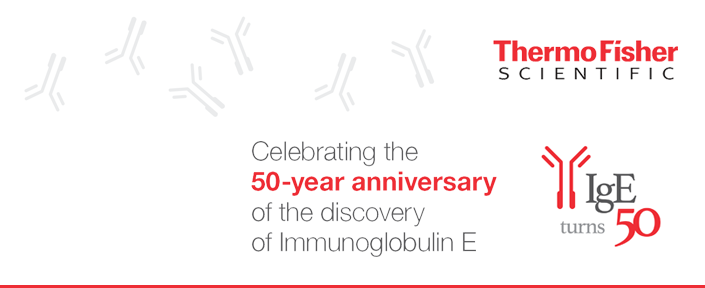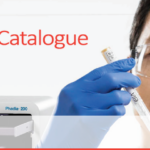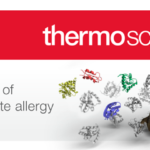Celebrating the 50-year anniversary of the discovery of Immunoglobulin E
Products are for professional/laboratory use only.
In 1906, a young Austrian pediatrician – Clemens von Pirquet – suggested that the first contact with an antigen can change the immune system to induce tolerance or hypersensitive reactions upon the second follow-up contact. He called this idea ‘Allergy’.
At about the same time, Charles Richet – a French physiologist studying the pathological effects of marine animal toxins in dogs – was the first to describe severe reactions due to hypersensitivity. To cut costs, he had been forced to re-inject toxins into those dogs that had survived a first dose. To his great surprise, he observed that this second exposure caused systemic shock and rapid death in several animals. Relating his findings to the immune system and its change in reactivity, he called these phenomena ‘Anaphylaxis’ or ‘counter protection’.
In 1921, Prausnitz and Kustner were able to show that allergic symptoms could be transferred from one individual to another using blood serum. This suggested that hypersensitivity was associated with a factor in the blood capable of mediating allergic reaction – a ‘reaginic’ activity of some sort.
But it would take more than 40 years for scientists to finally identify the new class of immunoglobulin associated with these phenomena: IgE. A discovery that would mark the start of an unprecedented transfer of scientific research into clinical application – and result in thousands of publications and vastly improved quality of life for millions: The history of IgE.
ThermoFisher has played an important role in the diagnosis of IgE mediated allergic disorders is now a global leader in Allergy diagnosis with the ImmuoCAP brand first introduced in 1980, following on with the fully automated Phadia Laboratory systems in the mid-1990s and in the new century the launch of the EliA brand, an automated platform for autoimmune assays.
The latest technology addition is the ImmunoCAP ISAC technology, a protein array to determine 112 allergy components for complex cases.
Abacus dx is proud to be associated with such an integral part of history through our partnership with ThermoFisher Scientific and the Phadia range of instruments for the detection of IgE-based allergens in the diagnosis of allergy.







